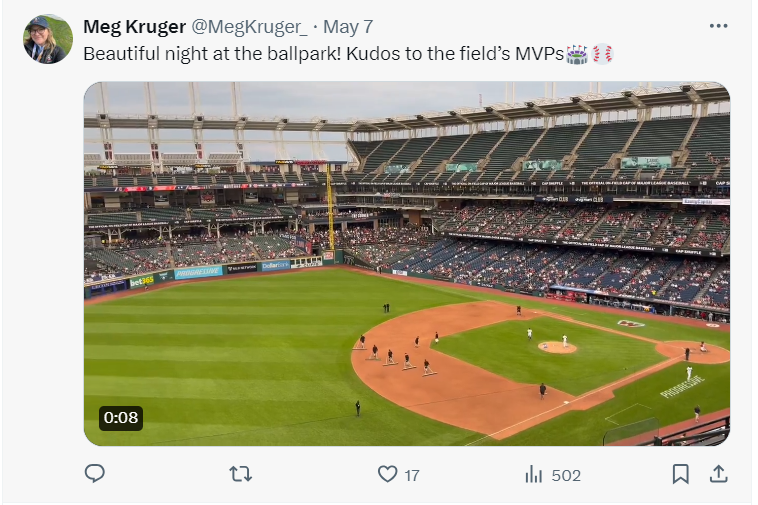By Robert Augsdorfer
Social media can be a challenge for those who don’t understand it or take the time to utilize it properly. But it can be a blessing for sports field managers who use it to their advantage when recruiting new employees or interns, showing off their fields and their work, or embracing it as a tool for networking with other industry professionals.
“Visibility matters. What that means is how social media – or just your physical visibility presence within your community – can really impact your day-to-day on the job,” said Meg Kruger, content marketing lead with Pioneer Athletics. “So, being present and being visible in the industry and in your community can help not only you and your career, but your crew and how you interact with your user groups.”
Kruger has been at the forefront of social media for sports field managers (SFMs), and runs the social media accounts for both Pioneer Athletics and the Women In Turf Team. Kruger also presented on how to build your brand using social media at the 2024 SFMA Conference in Daytona Beach. She compares social media to a living, breathing portfolio.
According to Kruger, social media can be a catalog for your achievements or those of your crew, and how that allows you to share stories and network with other field managers from throughout the country.
Leah Withrow, head groundskeeper for the Reno Aces (Triple-A affiliate of the Arizona Diamondbacks), is one of the most recognized sports field managers at the forefront of branding via social media. Withrow spoke on the topic of social media during the 2024 SFMA Conference.
“I really use social media as a digital resume,” Withrow said during a panel discussion on the future of sports field management. “If a future employer wants to know what my skills are, they can check my Twitter and see that I know how to edge a field, paint a field, spray a field. Whatever they need to know, I put it out there. On the flip side of that, whatever you put out there is out there forever, and employers will see that; so, my advice is to make it something good and make relationships out of that.”
According to Kruger, X (formerly Twitter), is still the best place to connect with other sports field managers and build that online portfolio.
“I’ve talked about tapping into the power of ‘Turf Twitter,’” said Kruger. “To me, it has everything that we love about this industry – the willingness to share, the networking and the camaraderie. That’s reflected on Turf Twitter; and if you’re not using it as a turf manager, you’re just denying a huge resource that you could have.”
However, the recent changes made to Twitter have deterred some people from using the platform altogether.
“My advice is whatever feels authentic to you and whatever you feel comfortable using is where you’re going to have success,” said Kruger. “If you’ve never used Twitter, or in the last year or so you’ve come to hate it completely, then you’re not going to have a good relationship with it. It’s the same thing if you get that kind of feeling with Facebook or Instagram.”
According to Kruger, if your audience tends to react to your posts on Facebook or Instagram more than Twitter, then it’s a good idea to stay on the platforms where you’re getting more views.
Platforms such as TikTok allow sports field managers to garner attention with videos of their work and their work environment – from timelapse videos of their fields to silly videos with their crews.
“You never know what’s going to resonate with someone,” said Kruger. “If you have no concept of what goes on behind the scenes, and you see someone painting a Super Bowl logo or something, that’s going to reach audience members. So, I think TikTok is right for those satisfying videos or the behind-the-scenes videos.”
Kruger’s advice for TikTok, Instagram Reels and YouTube Shorts is to keep videos short and sweet. Videos longer than three minutes should be reserved for educational topics.
During the SFMA Conference keynote panel, Withrow added that sports field managers need to view social media as another tool in the toolbox.
“You need to understand the benefits of going to YouTube and watching a video on how to fix something,” she said. “That’s something people didn’t have 20 years ago that is now in our pocket. Using social media to recruit interns and seasonal help has been a huge piece. Also, being able to message every single person in this room via Twitter, Instagram or Facebook to ask a question is something we didn’t have 20 years ago, either.”
Kruger also recommends LinkedIn as a social media tool SFMs should be using, as the connections you make through LinkedIn can help you get word out about job opportunities within your organization, and help you identify qualified individuals.
“You never know where those connections can lead you, so just creating a community on there and utilizing it for recruiting is a great avenue to take,” she said.
According to Kruger, the ultimate takeaway is to be authentic on social media. If it is something that comes naturally to you, people will see it as an authentic effort and something that your organization takes seriously.
Robert Augsdorfer is assistant editor of SportsField Management. For his full interview with Meg Kruger on the topic of social media branding, please listen to the SportsField Management podcast (https://sportsfieldmanagementonline.com/podcast/).

